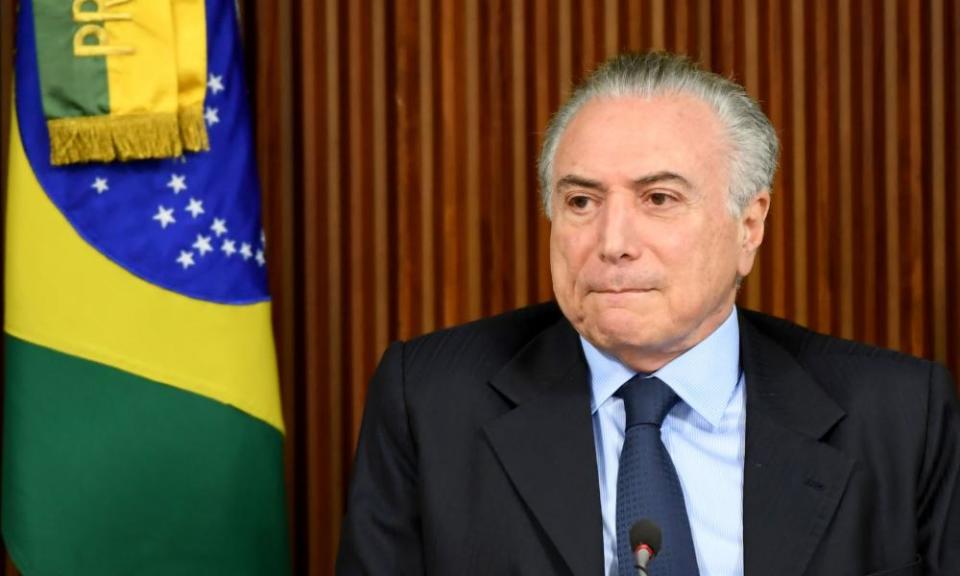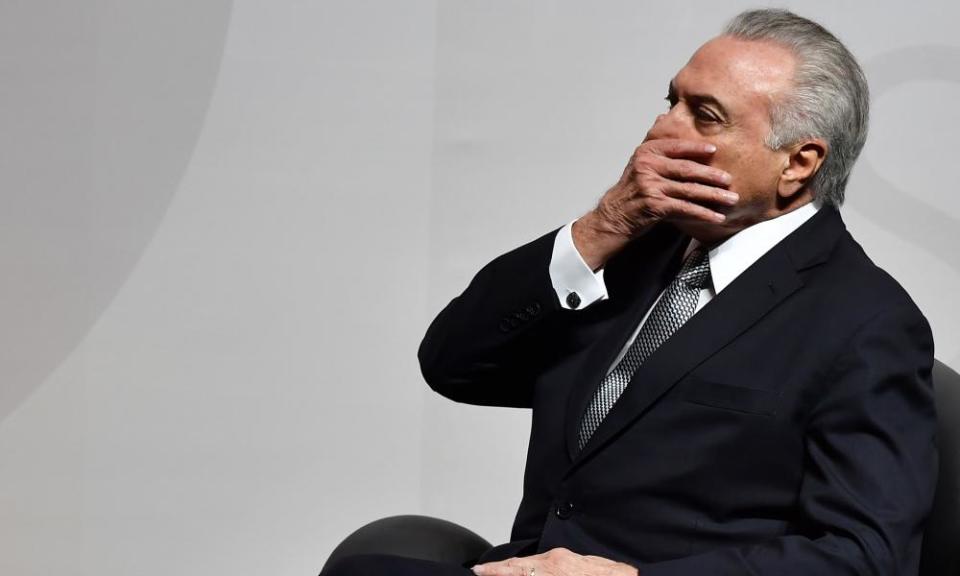Brazilian president Temer charged with obstruction of justice and racketeering
Office of the prosecutor general announces charges against Michel Temer
Lower house of congress to vote on whether president should stand trial

Brazil’s prosecutor general’s office has filed charges of racketeering against President Michel Temer and six other leading politicians from his party, three of whom are already in jail. Temer and two other men are also accused of obstructing justice.
“They practiced illicit acts in exchange for bribes by way of diverse public organs,” prosecutors said. “Michel Temer is accused of having acted as the leader of the criminal organisation since May 2016.”
Prosecutors said the group, all politicians from Temer’s Brazilian Democratic Movement party (PMDB), pocketed $188m in bribes.
Three of them are already in jail: two former speakers of the lower house, Henrique Alves and Eduardo Cunha, and Geddel Vieira Lima, a former Temer minister arrested for the second time last week after police found $16m in cash in an apartment linked to him.
Temer will now face a vote that could decide his presidency in the lower house of Congress – his second in a little over a month – and if two-thirds of lawmakers agree, he will be put on trial by the supreme court.
In a statement, Temer denied the charges and attacked the prosecutor general, Rodrigo Janot, who he said “continues his irresponsible march to cover up his own failings”. Temer said the new charges were “full of absurdities”, that prosecutors alleged payments to foreign bank accounts linked to him without providing evidence, and that the charges “transform licit campaign contributions into illicit, mix facts, and confuse to try and gain an air of truth.”
Temer, a resilient and wily politician, was able to muster enough congressional support to see off an earlier charge in August after his administration agreed $1.33bn in funding for lawmakers’ projects in their own states.
Analysts said he was in an even stronger position this time around, in part because Brazil was finally showing some signs of recovering from a debilitating recession.
“With the economy already showing more positive signs, he is more protected from the effects of a new indictment,” said Rafael Cortez, a political analyst at Tendencias, a consulting outfit in São Paulo.
The charges are one of the last acts for Janot, whose mandate officially ends on Sunday and who was weakened after the plea bargain deal he struck that led to the corruption charges Temer beat away on 2 August began to unravel.
Temer was first charged after a close aide was given more than $150,000 in cash – part of $12m in bribes prosecutors allege Temer and the aide were due to receive after intervening in a business deal.
Those charges came out of a plea bargain deal forged by executives from the Brazilian holding J&F Investments and the global meat brand JBS. One of those executives, Joesley Batista, had secretly recorded a compromising, late-night conversation with the president in March; another, Ricardo Saud, handed over $150,000 to a Temer aide in cash in a suitcase.

Since then, new recordings and emails have emerged that suggested Batista and Saud colluded with a prosecutor in Janot’s office who later joined a law firm acting for JBS. They have been jailed.
But while the executives may lose the generous benefits included in the deal, prosecutors have decided that the evidence they revealed of billions of dollars in bribes to almost 2,000 politicians, including the president, remains valid.
And the prosecutor general has also won some battles. On Wednesday, Janot survived a supreme court vote on whether to remove him from leading the Temer investigations. On Tuesday, a supreme court justice authorised another investigation for corruption and money laundering after the president issued a decree over ports that allegedly benefited a ports company.
Temer had already lost six ministers to scandals within his first six months, and saw investigations opened into another eight earlier this year.
“It is a roll call of very serious denunciations,” said José Álvaro Moisés, a professor of political science at the University of São Paulo.
This is bitterly ironic for Brazilians, because Temer was only able to come to power because of the multi-billion dollar graft investigation that drove the impeachment of the leftist president Dilma Rousseff, when he was then vice-president.
She was ousted on relatively minor charges of breaking budget rules. Last week, however, Janot filed racketeering charges against her, her predecessor Luiz Inácio Lula da Silva and other leaders of their Workers’ party, accusing the party of pocketing $470m in bribes from 2002 through 2016. Both Lula and Rousseff have denied all the accusations.
The Workers’ party also features in the new charges, with prosecutors alleging that it raided the coffers of the state-run oil company Petrobras to buy the support of allied parties like Temer’s PMDB. Prosecutors said that after Rousseff was suspended in May 2016, Temer’s party essentially took over her party’s central role in the bribe scheme.
Many Brazilians feel they are running out of politicians they can even consider trusting.
“It is generating the phenomenon of distrust,” said Moisés, the political science professor. “It is a very delicate, very serious crisis.”

